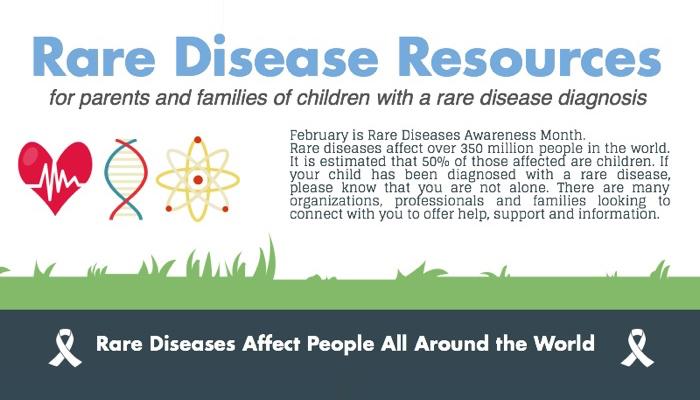Rare Disease Resources

Did you know that February is Rare Diseases Awareness Month? Rare diseases affect over 350 million people in the world and it is estimated that 50% of those affected are children. If your child has been diagnosed with a rare disease, please know that you are not alone. There are many organizations, professionals and families looking to connect with you to offer help, support and information.
7,000 rare diseases have been officially identified and 1 in 10 people in the United States have a rare disease. Unfortunately, 95% of these rare diseases do not have an FDA approved drug treatment and more rare diseases are being discovered every day.
Where to Find More Information
Research: Find information and resources regarding clinical trials and genetic research being conducted, assistance to help access medication and how you can become involved.
- Genetic and Rare Diseases Information Center (GARD)
- National Organization of Rare Diseases (NORD)
- Global Genes
- Foundation Fighting Blindness (FFB)
Connect: Learn how to find patient organizations, meetings and other families of children with rare diagnoses near you, as well as online.
Advocate: Participate in a variety of events and help spread the word about rare diseases in your community. Find more information about #RareDiseaseDay and what you can do to further the cause.
#RareDiseaseDay is the Last Day of February
Rare Disease Day is celebrated internationally by the rare disease community each year on the last day of February. The day seeks to raise awareness amongst the general public and decision makers about rare diseases and their impact on patients’ lives.
You can join in by finding more information at: www.rarediseaseday.org

Related Posts

Eye Conditions and Syndromes, Visual Impairment
Neuralink Announces Plans to Restore Sight to the Blind with Brain Chip
Elon Musk’s company Neuralink has announced plans to begin human trials of its new “Blindsight” brain chip by the end of 2025.

Health & Nutrition
Can Baby Skin Care Products Expire?
Is that forgotten tube of diaper rash cream still safe to use? Learn more about the expiration dates of popular skin care products for infants.

Health & Nutrition
Boosting Immunity in Kids: 3 Tips for a Healthy Winter
Parents can help boost their kids’ immunity during cold and flu season by maintaining healthy eating, sleeping, and exercising habits in the winter.